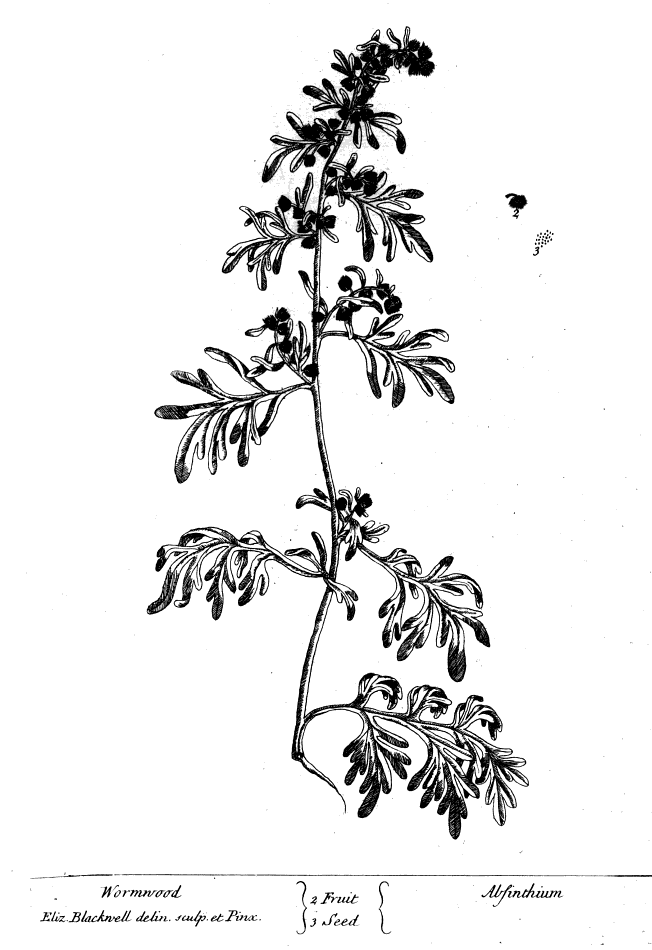Wormwood

Other names for Wormwood, Past or Present
English - Common Wormwood, Absinthe Wormwood, Green Ginger
Latin - Absinthium vulgare, Artemisia absinthium, Ponticum
German - Wermut
French - Aluyne, Absince
Spanish - Assentios, Alosna
Dutch - Alsem
Italian - Assenzo, Assentia
Wormwood - Actions
Wormwood is considered to be tonic, stomachic, antiseptic, antispasmodic.
Wormwood - Background & Uses
Wormwood is an annual medicinal plant indigenous to Asia that has been used in traditional Chinese medicine as a treatment for fever and malaria. [1] First used digestive tonics and patented medicines, wormwood was later used as an aromatic bitter in cocktail beverages.[1]
Wormwood contains an active water-soluble component absinthine, from which the French word absinthe is derived (Wormwood is a key ingredient in the controversial beverage of the same name). [2]
Its intensely bitter odor is said to repel insects (i.e. moths and fleas) from the home. [2]
Wormwood has been used as a remedy for maladies of the stomach and gallbladder, and to rid the body of parasitic worms. [4] However, such claims have not been tested or verified.
Wormwood - Scientific studies
Wormwood has been studied to determine the reason for its reported healing effects: pharmacutical testing has revealed its bioactive profile is composed of 95% Artemisinin, which might account for the antimalarial effects of Wormwood. [1]
In vivo testing has revealed that the Artemisinin molecule might inhibit the growth of tumor cells. Artesunate, a semi-synthetic deriviative of Artemisinin, has shown potential as an anticancer drug in clinical trials [1]
Wormwood in old Herbals & Pharmocopœia
Elizabeth Blackwell's "A Curious Herbal" (1751): 1. It grows to be three Foot high; the Stalks are hoary full of a white Pith, ye leaves are a willow-green above, and a light hoary underneath; the Flowers are yellow. 2. It grows in Lanes and waste Places, and flowers in July and August. 3. The leaves and tops are used; they purge melancholy humours, provoke urine, restore an appetite that is lost by drinking. They are good against the disorders of ye stomach, vomiting and surfeits; they strengthen the viscrea, kill worms, and are of service in dropsies, jaundice, tertian and quartan agues. In all ye above cases it is infused in water, ale or wine. A catasplasm of the green leaves beat up with Hog's Lard was commended to Mr. Ray by Dr. Hulse as a good external Remedy against ye swelling of the tonsils and quinsy. See Rays Cat. Plantarum. Officinal preparations are a simple water; a greater and a lesser compound water, a simple and a compound surup; an oil by infusion and decoction; and oil by distillation; an extract; a fixt salt.
J. Churchill - Pharmaceutical journal, Volume 3 (1844):
METHOD OF OBTAINING THE BITTER PRINCIPLE OF WORMWOOD: Take of extract of wormwood made with
proof spirit one part Distilled water twenty four parts Rub down the extract with the water in a mortar then
filter the mixture and having put the clear liquor into a matrass. Add Purified and finely powdered animal charcoal six parts.
Close the mouth of the matrass and heat it in a water bath for half an hour; after which
having prepared a filter containing another six parts of powdered animal charcoal well washed with boiling
water pour the solution of the extract over this and cover the filter to preserve the solution from the
action of the atmospheric air. The liquor which passes through the filter will be perfectly transparent and
insipid and is to be rejected as useless. The filtration being terminated collect the charcoal which contains
the whole of the bitter of the wormwood and treat it with pure spirit sp gr 0.835 in quantity double the
weight of the substance operated upon. The bitter principle will be obtained dissolved in the spirit by
filtration and thu greater part of the spirit may be recovered by distillation in a water bath The residue
of this operation concentrated to any required degree constitutes the pure bitter of wormwood. The bitter
matter of wormwood is a tonic agent of great energy and entirely free from acrimony. It contains nothing
stimulating for even in large doses it does not accelerate the circulation or raise the animal heat.
Gray's "Supplement to the Pharmacopeia", Pharmaceutical Society of Great Britian (1848):
Artemisia Absinthium. (Linn.) (E.B. 1230.) Absinthium vulgare (Lamb.) Common wormwood Fl. dingy yellow. August. Perennial.
Waste places on chalky soil. Bitter, stomachic, excites the appetite, promotes digestion, antiseptic and vermifuge;
it was recommended by Haller for keeping off fits of the gout, for which it is said to have served the Emperor
Charles V. This plant is thought to drive away insects from clothes and furniture, for which purpose it is often
laid into drawers and chests in the country. A very bitter alkali called absinthium has been obtained from it.
Brewers are said to add the fruit to their hops, to render beer more heady, and rectifiers to their spirits.
William Thomas Fernie - "Herbal Simples" (1895): WORMWOOD - The common Wormwood (Artemisia absinthium) has been partly considered here together with Mugwort, to which it is closely allied. It is a Composite herb of common growth on waste ground, being a bushy plant with silky stems, and collections of numerous small heads of dull yellow flowers.
The whole plant is of an aromatic smell and bitter taste. The flowers, when dried and powdered, destroy worms more effectually than worm seed, whilst the leaves resist putrefaction and help to make capital antiseptic fomentations.
Wormwood tea, or the powdered herb in small doses, mixed in a little soup, will serve to relieve bilious melancholia, and will help to disperse the yellow hue of jaundice from the skin.
This herb was formerly thought to possess the power of dispelling demons, and was thus associated with the ceremonials of St. John's Eve, bearing the name, on the Continent, of St. John's Herb, or St. John's Girdle.
Dioscorides declared it a preventive of intoxication, and a remedy for the ill-effects of that excess, for which reason the poculum absinthiacum was a favourite beverage.
Gerard says: "The plant voideth away the worms, not only taken inwardly, but applied outwardly; it withstandeth all putrefactions, and is good against the stinking breath." It keepeth garments also from the moths—A tineis tutam reddit qua conditur arcam (Macer); and Dr. W. Bulleyne says "it keepeth clothes from moths and wormes." This is the great preventive used by cloth manufacturers.
The characteristic odour of the plant is due to a volatile oil which consists mainly of absinthol; and the intensely bitter taste resides in "absinthin."
The plant also contains tannin, resin, starch, succinic, malic, and acetic acids, with nitrate of potash, and other salts.
Wormwood is of benefit in strengthless flatulent indigestion. An infusion may be made of an ounce of the dried plant to a pint of boiling water, and given in doses of from one to two tablespoonfuls three times in the day.
Absinthe, a liqueur concocted from Wormwood, is used largely in France, and the medical verdict pronounced there about its effects shows that it exercises through the pneumogastric nerve a painful sensation, which has been taken for that of extreme hunger. This feeling goes off quickly if a little alcohol is given, though it is aggravated by coffee, whilst an excessive use of absinthe from day to day is not slow in producing serious symptoms: the stomach ceases to perform its duty, there is an irritative reaction in the brain, and the effects of blind drunkenness come on after each debauch. The daily taking even for a short while only of a watery infusion of Wormwood shows its bad effects by a general languor, with obscurities of the sight, giddiness, want of appetite, and painful indigestion.
As a result of his experiments on animals, Dr. Maignan has come to the conclusion that absinthe (Wormwood) determines tremblings, dulness of thought, and epileptiform convulsions—symptoms which alcohol alone will not produce. Hence it may be inferred that absinthe contains really a narcotic poison which should prevent its being employed as a liqueur, or as a homely medicament, to any excess.
The medicinal and remedial uses of Wormwood have been already partly discussed, together with those of Mugwort.
Wormwood Image

Wormwood
References:
[1] Cho, William C.S. Supportive Cancer Care with Chinese Medicine. 2010 Springer Science & Business
Media: New York, NY.
[2] Absinthe. Wikipedia. (https://en.wikipedia.org/wiki/Absinthe).
[3] Padosch, Stephan A. et al. Absinthism: a fictitious 19th century syndrome with present impact. 2006.
Substance Abuse Treatment, Prevention, and Policy. 1(14).
[4] Weiss, Rudolph Fritz, M.D. Weiss's Herbal Medicine. Reprint, English translation. 1960.
Druckhaus Gotz: Ludwigsburg, Germany.
Main article researched and created by Kelsey Wambold,
© herbshealthhappiness.com


1. Famous Chef Sheds 60lbs Researching New Paleo Recipes: Get The Cookbook FREE Here
2. #1 muscle that eliminates joint and back pain, anxiety and looking fat
3. Drink THIS first thing in the morning (3 major benefits)
4. [PROOF] Reverse Diabetes with a "Pancreas Jumpstart"
5. Why Some People LOOK Fat that Aren't
6. Amazing Secret Techniques To Protect Your Home From Thieves, Looters And Thugs
7. The #1 WORST food that CAUSES Faster Aging (beware -- Are you eating this?)
If you enjoyed this page:



























